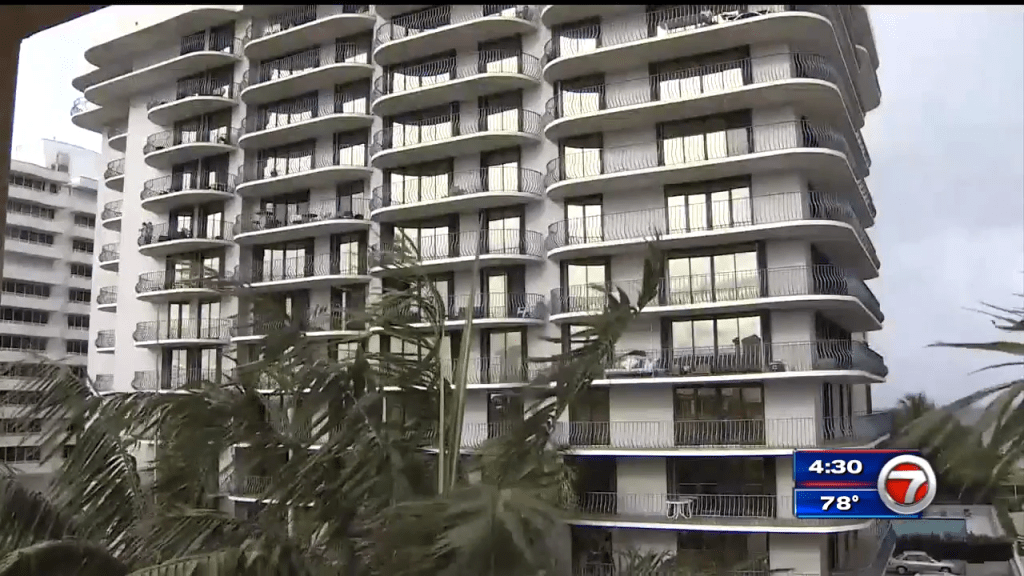TALLAHASSEE, Fla. (AP) — Across Florida, people living in the thousands of condominiums rising above the state’s 1,350 miles of coastline wonder if the building collapse in Surfside could happen to their home as state and local officials discuss what they can do to make sure it doesn’t.
Although building collapses are rare, local governments are looking at whether they need to adopt new inspection policies — the vast majority of counties don’t require reinspection of a building once it’s completed.
“We inspect bridges every two years and yet a high-rise can go up right on the coast and it’s inspected at the time it’s built and never again,” said Volusia County Chair Jeff Brower, who said residents have sent photos of damaged buildings. “It’s kind of a wake-up call, and some of the pictures I have seen of our own structures are scary.”
He’s in contact with the governor’s office on the issue but thinks acting locally will be quicker. One idea is reinspecting new buildings after 10 years and, depending on what’s found, inspecting again another decade later.
Miami-Dade County, where the 40-year-old Champlain Towers South partially collapsed last month, requires buildings to be recertified as safe every 40 years and every 10 years after that.
“We definitely have to have inspection of the infrastructure of these buildings,” Brower said. “They’re not falling all over the place, but we don’t want even one more like the tragedy at Surfside.”
The collapse prompted the county — as well as cities and towns within it — to take a closer look at the recertification rules already in place. One municipality, North Miami Beach has evacuated the nearly 50-year-old Crestview Towers and won’t allow residents back in until required repairs have been completed. The county announced late Friday that the 28-story Miami-Dade County Courthouse will begin undergoing repairs immediately because of safety concerns found during a review prompted by the deadly collapse of a nearby condominium building
Florida’s beachfront high-rises take a beating from storms, saltwater and sea air, which can wear down concrete and rust rebar. There isn’t a mile of Florida’s coastline that hasn’t been affected in one way or another by hurricanes and tropical storms in the past 40 years — with some areas taking multiple hits.
Although construction standards improved when statewide building codes were strengthened in the 1980s, the quality before then was often questionable, said Brett Turner, a project manager in southwest Florida who has been in the construction industry for 45 years.
“Up until the late ’80s, there virtually were no inspections. Our codes were horrible. So any building or house that was built prior to 1986 is suspect,” Turner said. “It was the Wild West — whatever you could get away with if you were making a buck.”
Turner, who previously specialized in repairing older buildings, said he’s seen very dangerous damage in Florida buildings. “I’m surprised that (Surfside) is the first one that I’ve seen this happen to,” he said. “I’m not surprised it happened; I’m surprised it’s the first one.”
In Boca Raton, officials are working quickly to establish a recertification process for older buildings, Councilman Andy Thomson said.
“We have a number of high-rise condos on the beach, particularly. And I think that’s what causes the most heartburn for people because of the potential of corrosion due to saltwater,” Thomson said.
Steven Rogers lives at the Chalfonte condominiums in Boca Raton, where neither the city nor Palm Beach County requires building recertification. But Rogers, who was elected the condominium association president, said they’re not waiting for either to set a policy.
The association hired engineers two years ago to inspect the two 22-story towers built in the late 1970s on the Atlantic Ocean. Rogers said he called engineers again after the Surfside collapse and told them he wants an inspection policy that’s more stringent than Miami-Dade’s. The association is now making repairs with plans to do so every year.
“Do inspections that you feel are necessary, not what the city or the state feels is necessary,” Rogers said. “It’s going to take time for the city or the state to come out with new laws, and in that time, we have to move. We have to do the right things now.”
How the state will act could depend a lot on what’s learned about the Surfside collapse, Republican Gov. Ron DeSantis said at a news conference.
“We want to be able to identify, why did this happen? Is this something that was unique to this building?” DeSantis said. “Is it something that buildings of that age that would have implications beyond that, whether southern Florida or the entire state of Florida? I think we need to get those definitive answers.”
Democratic state Sen. Jason Pizzo, who represents Surfside, has indicated he’ll seek legislation to address condominium inspections when lawmakers return to Tallahassee in January.
“We’re going to be pushing for a few new provisions in FL condo law (like we have for the last three years). In the interim, condo associations must comply with existing laws and serious structural deficiencies, so our residents are not uprooted and forced to sleep in shelters,” Pizzo recently tweeted.
Escambia County, which includes Pensacola Beach, has no recertification program for older high-rises, and Building Services Director Tim Tolbert said the area will probably wait to see if a statewide code is enacted.
“I think it will be more enforceable that way,” Tolbert said. “Even if that’s a requirement and an association refuses to do anything, what do you do? If you go to condemn the building, you’re talking about major lawsuits. It’s just going to be tough to enforce even if it’s a state requirement.”
Copyright 2024 The Associated Press. All rights reserved. This material may not be published, broadcast, rewritten or redistributed.

